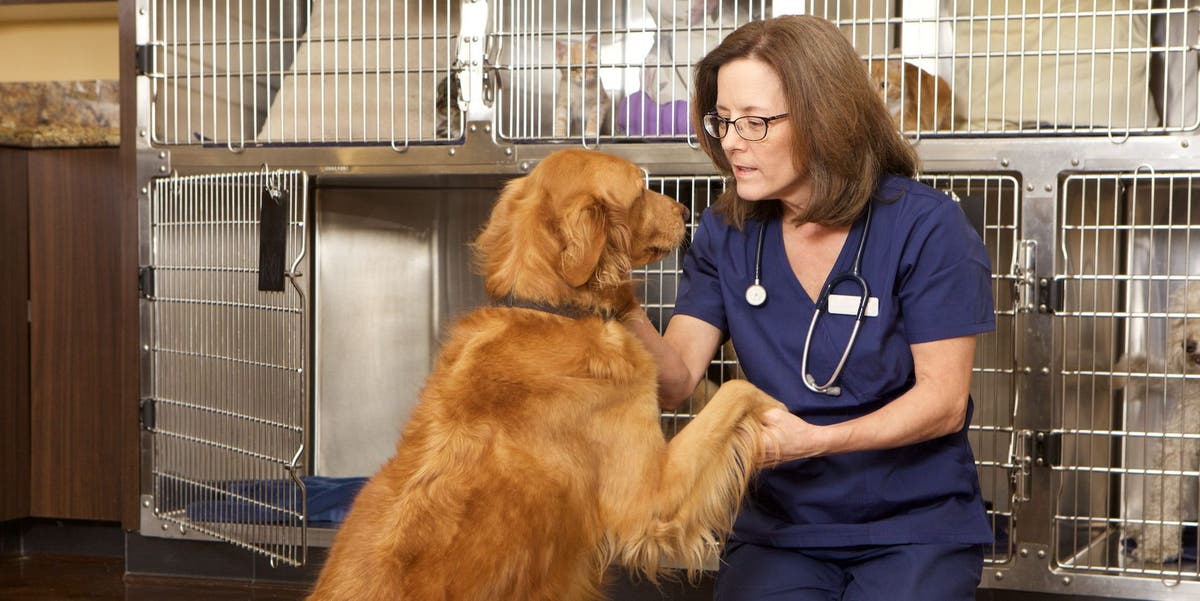Understanding the Role of a Veterinary Behaviourist in Family Pet Training and Wellness
The role of a veterinary behaviourist is vital in dealing with the intricate partnership in between animals and their proprietors. They integrate veterinary medication with insights from pet habits science to take on problems like aggression and anxiousness. Unlike conventional trainers, their technique concentrates on the underlying sources of these behaviors. This nuanced viewpoint questions concerning the efficiency of conventional training approaches and exactly how a much deeper understanding can transform pet health. What techniques do they employ to achieve these outcomes?
What Is a Veterinary Behaviourist?
A vet behaviourist is a specialized expert that focuses on understanding and resolving the behavioral concerns of animals, especially pet dogs. Their experience integrates vet medication and animal habits scientific research, enabling them to detect and treat a large range of behavioral issues - canine behaviourist near me. These experts usually hold postgraduate degrees, such as a Master's or PhD in pet actions, and are certified by relevant organizations, guaranteeing they have a deep understanding of pet psychology
Veterinary behaviourists evaluate animals with thorough observation and analysis, thinking about aspects such as genes, setting, and training background. They develop tailored behavior adjustment plans, which may consist of desensitization methods, favorable support approaches, and ecological adjustments. Collaboration with animal owners is necessary, as they give advice and assistance throughout the training procedure. Inevitably, the objective of a vet behaviourist is to boost the health of the animal while promoting an unified partnership between family pets and their proprietors.
The Relevance of Recognizing Pet Habits
Recognizing pet behavior is crucial for both pet proprietors and specialists in the area of pet treatment, as it lays the foundation for effective interaction and training. Identifying exactly how pets perceive their atmosphere and reply to stimulations enables caretakers to create a more harmonious living circumstance. Understanding into behavioral signs, such as body language and articulations, fosters stronger bonds between pets and their owners. By appreciating the natural instincts and needs of different species, people can customize their training approaches to accommodate these variables, advertising much better understanding and teamwork. In addition, a strong understanding of behavior scientific research aids in recognizing stressors and prospective triggers, permitting aggressive interventions. In general, comprehending pet behavior not just improves the health of pet dogs however additionally enriches the experiences of those who care for them, inevitably resulting in much healthier, better connections.
Common Behavioral Issues Resolved by Vet Behaviourists
Veterinary behaviourists frequently resolve usual behavioral problems in family pets, consisting of aggression and worry actions. They additionally concentrate on anxiety and stress monitoring, which can considerably impact an animal's well-being. Comprehending these concerns is crucial for establishing efficient training and treatment methods.
Aggression and Worry Responses
While numerous pet dog owners may see hostility and worry feedbacks as easy behavioral problems, these intricate responses often originate from underlying anxiousness or past injury. Vet behaviourists play an essential duty in identifying the source of these behaviors, which can show up in different kinds, consisting of growling, attacking, or too much fear of specific situations. Recognizing these triggers is crucial for creating efficient training strategies customized to each pet dog's distinct scenarios. Behaviourists employ approaches such as desensitization and counter-conditioning to assist animals handle their anxieties and aggression. Furthermore, they educate animal proprietors regarding suitable monitoring techniques, stressing the relevance of patience and consistency. Attending to aggressiveness and fear reactions not only boosts the pet dog's top quality of life yet also enhances the bond between pet dog and proprietor.
Anxiety and Tension Management
Anxiety and tension are common problems that lots of animals face, often arising from adjustments in their setting, lack of socializing, or previous negative experiences. Veterinary behaviourists play a vital function in identifying the underlying reasons for these concerns. They employ various methods, consisting of behavioral alteration, desensitization, and counter-conditioning, to assist pet dogs handle stress and anxiety. Furthermore, they might suggest environmental adjustments, such as developing safe spaces or providing enrichment activities that promote leisure. Collaboration with animal proprietors is essential, as behaviourists guide them in recognizing their pet dog's signals and implementing efficient coping techniques. By resolving stress and anxiety and anxiety, veterinary behaviourists add greatly to boosting the total health and top quality of life for pet dogs and their families.
Exactly How Vet Behaviourists Differ From Typical Fitness Instructors
Veterinary behaviourists differ from standard fitness instructors mainly in their academic histories and training. While standard trainers commonly concentrate on obedience and basic commands, veterinary behaviourists stress understanding and attending to underlying behavior issues, incorporating clinical considerations into their approach. This distinctive emphasis permits them to give a much more thorough treatment for pets with intricate behavioral obstacles.
Education And Learning and Training Distinctions
Understanding the difference between vet behaviourists and standard instructors is vital for pet dog owners looking for reliable training remedies. Vet behaviourists have postgraduate degrees in veterinary medication, typically complied with by specialized training in animal behaviour. This education outfits them to resolve complicated behavioural issues that might come from medical problems or mental elements. On the other hand, typical fitness instructors normally have certifications from training programs that concentrate on obedience and standard commands without diving into the underlying emotional or clinical facets. While both specialists intend to enhance pet dog practices, vet behaviourists can detect and deal with behavioral troubles holistically, incorporating medical knowledge into training strategies. This important distinction highlights the importance of picking the appropriate specialist based upon the animal's specific needs.
Concentrate On Behavioral Issues
Addressing behavioral problems requires a nuanced strategy that identifies vet behaviourists from traditional instructors. While conventional instructors frequently concentrate on obedience and basic commands, vet behaviourists check out much deeper into the underlying reasons for bothersome behaviours. They utilize a comprehensive understanding of animal psychology and therapy strategies, which are rooted in scientific research study. This expertise enables them to determine problems coming from stress and anxiety, fear, or aggressiveness, instead of merely attending to surface-level signs and symptoms. In enhancement, veterinary behaviourists analyze the animal's overall well-being, taking into consideration environmental variables and the pet's history. By integrating clinical understanding with behavioral techniques, they offer tailored solutions that promote lasting behavioural modification, making sure both the animal's and proprietor's lifestyle are markedly enhanced.
Clinical Factors To Consider Included
While traditional instructors might neglect hidden clinical issues, vet behaviourists prioritize a comprehensive assessment of a family pet's health as a foundational action in attending to behavioral problems. This approach allows them to recognize potential medical problems that might add to unfavorable practices, such as anxiety, pain, or neurological disorders. By incorporating clinical evaluations right into their practice, veterinary behaviourists can team up with vets to guarantee an all natural understanding of the pet's health. Furthermore, they can suggest ideal therapies or modifications to original site training plans based on clinical findings. This extensive viewpoint distinguishes vet behaviourists from conventional instructors, as they address both behavioural and health-related factors, eventually leading to click here to read more reliable and lasting end results for family pets and their proprietors.

The Process of Working With a Veterinary Behaviourist
Collaborating with a veterinary behaviourist includes a methodical approach to attending to a family pet's behavior concerns. The process begins with a substantial assessment, where the behaviourist gathers comprehensive information regarding the pet dog's history, atmosphere, and particular habits that are troublesome. This generally includes surveys, meetings with the pet owner, and often observations of the family pet in its atmosphere.
Adhering to the evaluation, the veterinary behaviourist creates a tailored intervention strategy that may consist of behavior alteration methods, training approaches, and, if required, suggestions for medical evaluations. cat behaviourist near me. The strategy is created to be functional and possible, ensuring that it fits flawlessly right into the animal owner's lifestyle
Subsequent follow-up sessions are vital to monitor progress, readjust techniques, and offer assistance. This joint initiative not just intends to change unwanted actions yet likewise to enhance the total health of the animal, guaranteeing a harmonious relationship between the animal and its owner.
Enhancing Your Family pet's Top quality of Life Through Behavioral Assistance
Enhancing an animal's quality of life through behavioral assistance is essential for cultivating a healthy and balanced and satisfying connection in between pets and their proprietors (dog behaviourist near me). Veterinary behaviourists play a vital function in identifying and addressing behavioral issues that might impede a pet's well-being. Through customized strategies, they help minimize stress and anxiety, worry, and aggression, eventually advertising a much more balanced and pleased animal
Behavioral support includes different techniques, including positive reinforcement, environmental enrichment, look at these guys and socializing. By executing these strategies, owners can develop a nurturing atmosphere that encourages favorable habits. This not only boosts the family pet's emotional health but likewise strengthens the bond between pet dog and owner.
Additionally, normal examinations with a vet behaviourist warranty that any type of emerging behavior problems are immediately attended to, stopping rise. In general, buying behavioral support is an aggressive approach that substantially improves a family pet's life, bring about boosted physical and mental health results.
Frequently Asked Concerns
What Credentials Do Veterinary Behaviourists Have?
Vet behaviourists generally hold a vet level, complied with by specialized training in animal behavior. Many also possess certifications from acknowledged companies, showing their proficiency in attending to pet habits problems and promoting overall pet health.
Can Veterinary Behaviourists Suggest Drug for Animals?


Vet behaviourists, possessing vet degrees and specialized training, can indeed prescribe medication for family pets. This ability enables them to address underlying behavior issues successfully, often incorporating medicinal treatment with behavior alteration techniques for ideal outcomes.
For How Long Does Behavioral Treatment Generally Take?
Behavior modification period varies considerably, usually varying from a couple of weeks to several months. Elements influencing this timeline include the family pet's particular concerns, uniformity of training, and the proprietor's involvement at the same time.
Are Remote Examinations Readily Available With Vet Behaviourists?

Just how much Does a Veterinary Behaviourist Appointment Cost?
The expense of a vet behaviourist consultation commonly varies from $100 to $300, relying on variables such as location, experience, and session size. Added charges might look for follow-up consultations or specialized solutions.